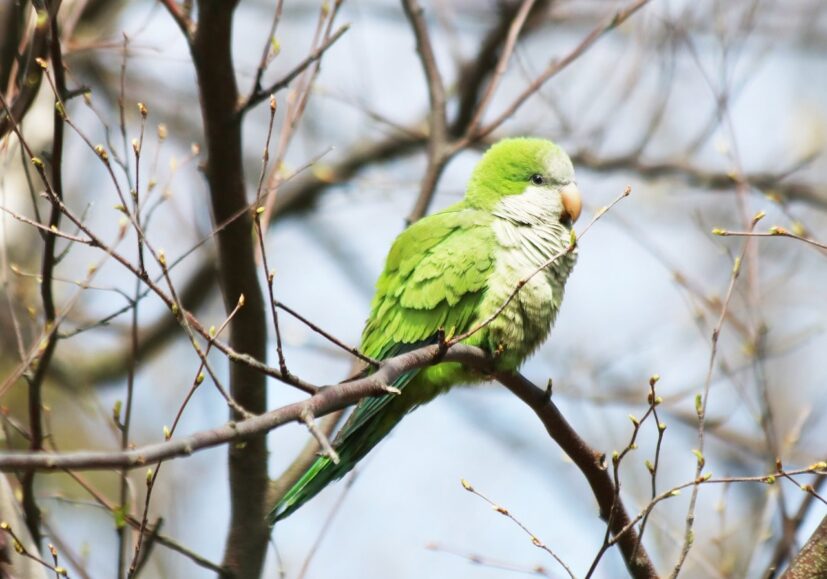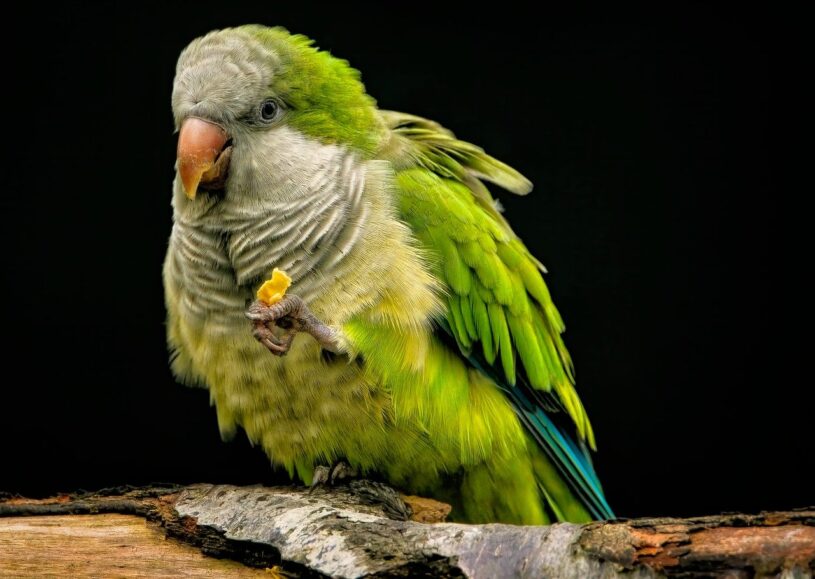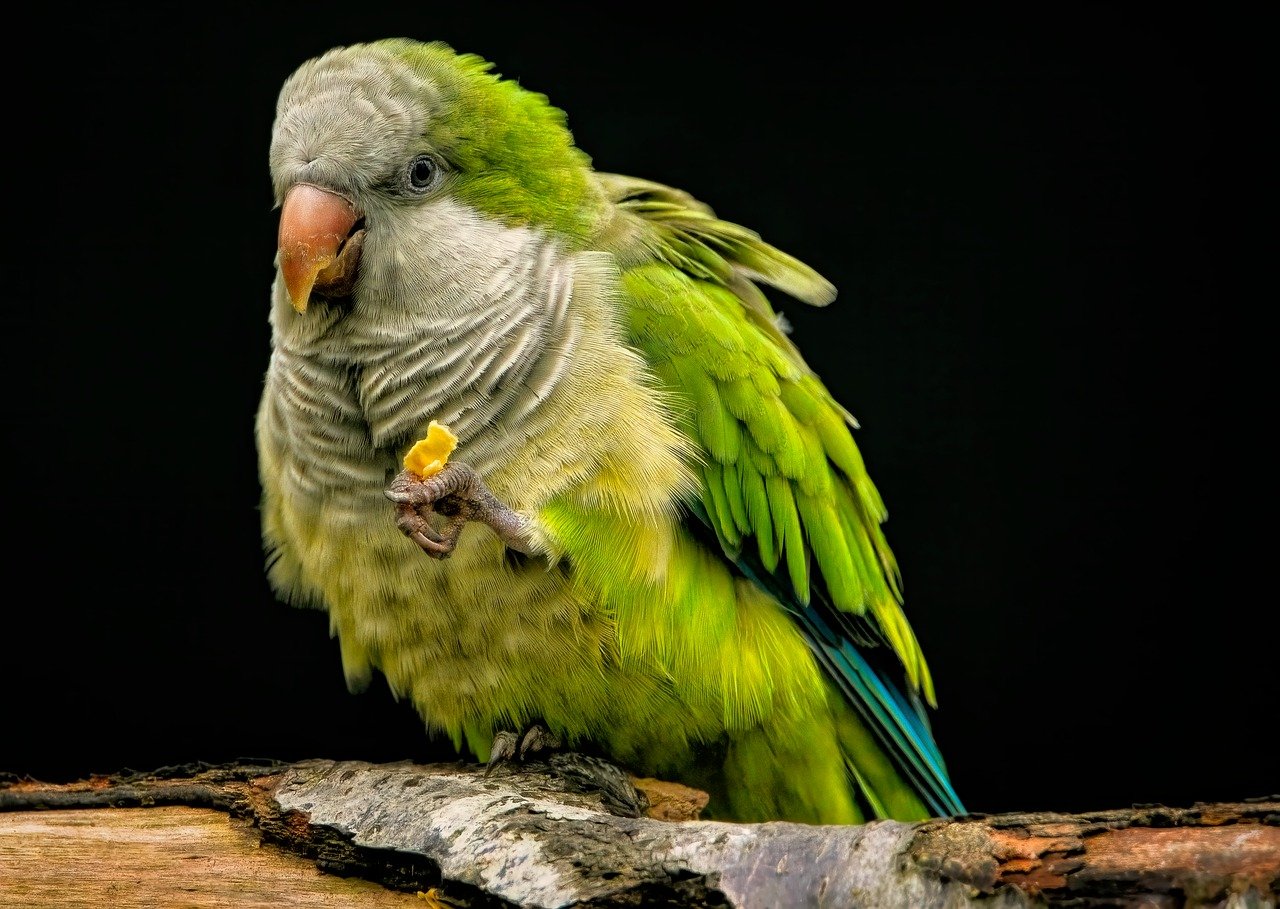Lifespan of Quaker Parrot
The lifespan of Quaker Parrots is relatively long in both the wild and captivity. But exactly how long does a Quaker Parrot live?
This guide will explore the average lifespan of Quaker Parrots, the differences between wild and captive lifespans, factors that influence their longevity, and more.
Another name for Quaker Parrots is Monk Parakeets. They are beloved pets due to their vibrant personality, intelligence, and ability to mimic human speech. In many parts of the United States, these caged birds have become naturalized on several continents.
How long does a Quaker Parrot live?
Quaker Parrots typically live 20 to 30 years. They may live longer depending on their environment, diet, and overall care. If properly cared for, these birds can flourish and live long lives, bringing joy to their owners for a lifetime.
Quaker Parrot Lifespan in the Wild
Quaker parrots live significantly shorter lives in the wild than in captivity. There is limited reliable information on the lifespan of wild Quaker Parrots. However, banding studies suggest that wild Quaker Parrots can live as long as 15 years, with some birds reaching at least six years of age.
Several factors contribute to this shorter lifespan in the wild:
- Predation: Various predators prey on Quaker parrots, including birds of prey, snakes, and mammals.
- Disease: Wild environments pose a greater risk of disease and parasite exposure compared to controlled environments.
- Limited food and resources: Finding sufficient food and resources can be challenging in the wild, affecting health and longevity.
In Argentina, studies show that over 80% of adult Quaker Parrots survive year on year, while first-year birds have a survival rate of 61%.
Quaker Parrot Lifespan in Captivity
The lifespan of a Quaker parrot in captivity is much greater than in the wild. The average lifespan of Quaker Parrots in captivity is 12 to 15 years, but they can also survive for 20 to 30 years. With proper care, Quaker Parrots can live much longer than their wild counterparts. Often, they have access to medical care, which significantly increases their lifespan. Quaker Parrots are protected from bad weather and predators. Food, water, and shelter can enable them to survive in captivity.
Considering Quaker Parrots as pets
The Quaker Parrot is a long-term commitment, so keep that in mind if you’re considering getting one. Caring for them may take 20-30 years or even longer.
Quaker parrots need regular checkups with an avian veterinarian to stay healthy and to identify potential health problems early on.
Owning a parrot is a big responsibility. Ensure they have the right environment, care, and attention for years.
Factors Affecting Quaker Parrot Lifespan

For a Quaker Parrot to live a long life, several factors must be considered:
- Diet: It is essential to provide them with a balanced diet filled with fruits, vegetables, grains, seeds, and pellets.
- Exercise: Regular physical activity helps maintain their physical and mental well-being.
- Mental Stimulation: Playing with engaging toys, interacting with others, and training can keep them mentally stimulated and happy.
- Veterinary Care: Regular check-ups and timely medical care prevent and resolve health problems.
- Environment: A clean, safe, and stress-free environment is vital for their well-being.
- Social Interaction: Quaker parrots are social creatures. Don’t forget to spend time with them daily, make sure they get a chance to interact with you and consider getting them a companion parrot if you can’t devote enough time to them.
- Cage Environment: Ensure that your cage has plenty of room for the birds to fly, climb, and perch. Include perches of different textures and sizes to keep their feet healthy.
Additional Factors Affecting Lifespan:
- Genetics: Quaker parrots are less controllable, but their genetic predisposition can affect their lifespan.
- Stress: Stressful environments can negatively impact their health. The cage should be protected from loud noises, sudden changes, and unfamiliar people.
- Accidents and Injuries: Parrot-proofing your home can help prevent accidents and injuries that may shorten your pet’s life.
Considering the above factors, you can significantly increase your Quaker Parrot’s lifespan. Remember, a Quaker Parrot is a long-term commitment; taking good care of it now will ensure its well-being for many years.
Lifecycle of a Quaker Parrot
Quaker Parrots begin their lives in an egg stage and become adults.
1. Egg Laying and Incubation:
The female Quaker Parrot lays 4-8 eggs. Both parents participate in incubation. It takes around 28 days for both to keep the eggs warm.
2. Hatching and Chick Development:
A chick is helpless and requires constant care from its parents for warmth and food. Until the chicks become fledglings, around 8-10 weeks old, their parents feed them regurgitated food.
3. Fledgling Stage:
Fledglings leave the nest but remain dependent on their parents. They provide food and protection for another 2-3 months. During this time, their parents teach them to fly, and they forage for food with them.
4. Independence and Sexual Maturity:
Quaker parrots become increasingly independent and begin foraging for food in their early years. A bird may take 1-3 years to reach sexual maturity, but breeding behavior may not begin until then.
5. Breeding:
A pair of Quaker Parrots may remain monogamous for life. An average clutch of 4-8 eggs is laid once a year.
Quaker Parrots Are Illegal in Some Places
In some regions, owning Quaker Parrots as pets is illegal because of concerns about their potential impact on agriculture and the environment. Native birds can compete with them for resources and damage crops, disrupting local ecosystems. Some states in the US, such as California, Georgia, Colorado, Hawaii, etc., have banned Quaker parrots as pets. Before adopting a Quaker Parrot, make sure you check your local regulations. If you want to read more about Quaker’s history and origin READ MORE.

Quaker Parrots Are Not Endangered,
While Quaker Parrots face a few legal restrictions, they are not considered endangered. They have a stable population in the wild and are also found in urban areas. Globally, the Quaker parrot’s population is stable or even growing.
Conclusion
Proper care can increase the lifespan of Quaker Parrots. You should focus on their diet, environment, healthcare, and social needs.
REMEMBER, adopting a Quaker Parrot is a long-term commitment, so you should understand their needs.
Their intelligence and charm capture people’s hearts, whether they live in the wild or as pets.


1 thought on “How long does a Quaker Parrot live? (Lifespan of Quaker)”